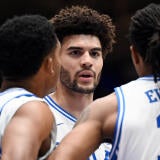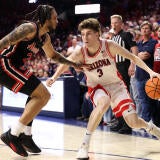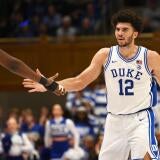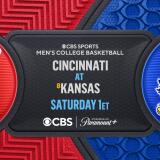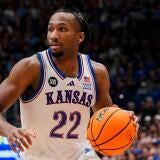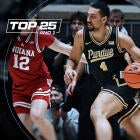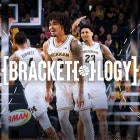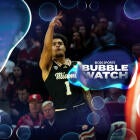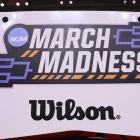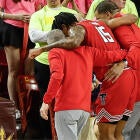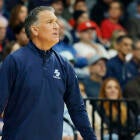Putting the 16 teams with a realistic shot at winning the 2019 NCAA Tournament title into tiers
Of course the usual suspects are on this list, but we count six surprise/non-traditional teams that can stun and win it all in 2019
The democratic approach and feel of college basketball's postseason competition is a major selling point of the sport.
March is synonymous in sports with only one thing: college hoops. That's a benefit and a burden, but it ultimately reminds us that any school with Division I alliance is in competition for the college basketball's ultimate prize. We get to see this in tangible form through high-stakes league tournaments that beget one of the most beautiful sights in the world: an NCAA Tournament bracket. An arrangement that can include Duke, Kansas and Kentucky in the same vat of frenzy as Tennessee Tech, Murray State, Lehigh and UC Davis.
Whereas college football, which is obviously fantastic in its own ways, has formal, informal and plutocratic ways of limiting its national playoff and championship to a select sect of programs, college basketball at least allows teams for the hopes of getting in and then becoming Loyola-Chicago, Butler, George Mason, Wichita State or VCU. There is no school getting wrongly suppressed the way UCF football was last year ... and, though still undefeated as of now, could again this season.
The reality is, college basketball's mid-majors (and UNLV under Tark does not count) haven't won national titles because it's excruciatingly hard to do so. Schools in power conferences have more resources, coaching advantages and recruiting assets to withstand four months of play -- and then go on to beat five or six good-to-great opponents when it matters most.
Every year college basketball has more national title contenders than college football, but the cache of teams is seldom larger than 20. In 2016 I identified 19 candidates. Last year it was 16 -- as is the number for the season ahead. And not all championship hopefuls can be grouped together.
But I do guarantee to you that one of these 16 will wind up at the end of "One Shining Moment" on the night of April 8, 2019.
Frontrunners
Frontrunners sit atop the sport heading into the season and make the most sense right now to be considered favorites.
Breakdown: With KU's annual ownership of the Big 12 (if you've lost count, it's going for 15 straight regular season titles, which shouldn't be possible in the material world), it gets tough to sort one really, really good Jayhawks team from another really, really good Jayhawks team as the years go on. But this one truly could be a top-five Kansas crew under Bill Self. Even with the college basketball corruption trial becoming an appendage to the Kansas story of 2018-19 (Silvio De Sousa is indefinitely on leave because of what was uncovered in federal court), the Jayhawks have a stock of veteran talent up front and promising freshmen in the backcourt. Dedric Lawson, who came by way of Memphis, will join forces with Udoka Azubuike to make up what might be the most intimidating 1-2 big man combo in college basketball. Flashy guard Quentin Grimes is likely one-and-done, while Lagerald Vick is back for his senior season. This should be a better team on defense than the one from last season ... which made the Final Four.
Stat to know: The Jayhawks have 10 guaranteed or potential matchups during the regular season against teams that are reasonably projected to finish first or second in their conference: Michigan State, Vermont, Louisiana, Tennessee, Marquette, Wofford, New Mexico State, Villanova, South Dakota and Kentucky. And this doesn't even include the road game against Arizona State.
Breakdown: The Bulldogs haven't had a team this thin on robust big men in a while. Killian Tillie, Rui Hachimura and San Jose State transfer Brandon Clarke are all forwards, but none are thighs-thick-as-watermelon bigs. Zags coach Mark Few told me recently that he's curious to see how his team plays given its unconventional rotation early on, but he and everyone else knows that Gonzaga's set to be elite this season. The Bulldogs have four of the 50 best players in the sport as far as we're concerned. With Hachimura much improved on defense and the team only losing two key players from last season, Gonzaga has a very good chance to do something that's very hard to do: finish top-10 in offensive and defensive efficiency. Doing that puts you at or near the top of the national title conversation, no matter what team you are. This team is going to spend some weeks at No. 1 in the polls this season.
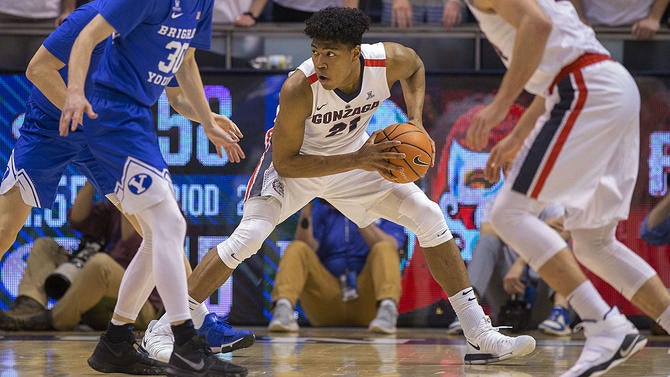
Stat to know: Gonzaga's made 20 straight NCAA Tournament appearances, which is the sixth-longest streak in the sport's history. Only four schools currently have longer streaks: Kansas (29), Duke (23) and Michigan State (21). To no surprise, all those schools are featured in this story.
Breakdown: Eric Musselman's got genuine, lawful men in Reno, Nevada. The Wolf Pack, thanks to an abundance of redshirt seniors and juniors, have stockpiled 21- and 22-year-olds. With eight seniors and five juniors on the roster -- many of them transfers who had to sit a season -- Nevada might have the oldest roster in the country. Combine that with at least four potential NBA players on the roster (freshman Jordan Brown is the first five-star player to commit to Nevada in school history, then there's Jordan Caroline and Cody and Caleb Martin) and the Wolf Pack are an easy call for frontrunner status. It won 29 games last season and should best it in 2018-19. Can good habits remain static from one season to the next? No team took care of the ball better last season than Nevada. If it keeps the best turnover rate on offense, it'll be hard to beat -- because Nevada won't beat itself.
Stat to know: This is a program that's 43-5 at home under Musselman and could be 58-5 by season's end. The toughest forecasted opponent for Nevada at the Lawlor Events Center is BYU, which happens to be next Tuesday's season-opener.
Breakdown: John Calipari's team received preseason votes for No. 1 status, and rightfully so. Kentucky's got vets, man! By that I mean: hello, sophomores! Quade Green, P.J. Washington and Nick Richards, welcome back. Throw in Stanford grad transfer Reid Travis and it's got to have Calipari stressing a little less this preseason than the recent ones with so many young guys overtaking the roster. If you look at why Kentucky's set up better in 2018-19 than the past three seasons, at least toward winning a national title, the biggest reason would be 3-point shooting. Tyler Herro, Jemarl Baker, Keldon Johnson and Ashton Hagans will collectively force defenses to be uncomfortably honest all season long. Thanks to Kentucky's depth, size, shooting, athleticism, canoe-full of future pros and its coaching value with Calipari, the Wildcats will be expected to show a sharp edge from November on.
Stat to know: Travis, considered the most important transfer this season, was third in the Pac-12 in scoring (19.5) and rebounding (8.7) last season.
Breakdown: I'm skeptical of Duke winning the 2019 national title because no program that's started four freshmen has ever won a Division I men's basketball championship. Duke indeed seems set to start four freshmen, all of whom could become first-round, if not lottery, picks. R.J. Barrett is in place -- maybe he'll hold that place, maybe he'll slip to ... third? -- as the No. 1 choice for 2019. Duke's got some fun talent. Hard to shake off Mike Krzyzewski's ability to get any team into the national title convo. From a betting standpoint, Duke is obviously a frontrunner. So here they are. It should be quite a lab test with this team. In some ways, we can look at Duke the same we we've had playful skepticism over previous Kentucky teams.
Stat to know: If Duke works its way to No. 1 in the AP poll at any point this season (but UCLA doesn't), the Blue Devils will overtake UCLA for most weeks at No. 1 in the history of the poll. The two programs are tied at 134 weeks as No. 1 all time heading into this season. That's more than six seasons' worth of being ranked No. 1 for each school.
Title contenders
Title contenders are just a level below the frontrunners but still, on paper, clearly possess the roster to win it all.
Breakdown: It speaks to Roy Williams' ability as a coach and dexterous recruiter that his Tar Heels are in this spot two years removed from a national title and even less time than that from exiting a polarizing NCAA investigation. (In a controversial ruling, UNC was not dinged for university-wide academic impropriety.) Now North Carolina has a top-15 recruiting class linking up with preseason All-American Luke Maye, vital second-year grad transfer Cam Johnson and imperative senior combo guard Kenny Williams. Nassir Little and Coby White are the new faces to know. Hard to see this team not being one of the best on offense in the sport. When the Heels are good, college basketball feels better.
Stat to know: UNC brings back 65 percent of its points 67 percent of its rebound production from last year. This will not be the drop-off some expect UNC to take. Five of the top seven players are back -- and in comes two top-25 players in Little and White.
Breakdown: Villanova is both a modern blueblood and traditional college basketball power. Don't let the past two national titles delude you into thinking Villanova's only recently come into its riches. It's one of just nine schools to win at least three national titles. That 1985 championship has gone a long way to lore-building in Philly. The Wildcats will come out of the legitimately elite Big East and aim for a sixth consecutive season as a No. 1 or No. 2 seed. I sat down with Villanova coach Jay Wright recently and he told me the most crucial component to this season going as well as other regular seasons: the growth of the sophomores. Collin Gillespie, Dhamir Cosby-Roundtree and Jermaine Samuels need to pop. Two out of three likely will. Then there's Eric Paschall and Phil Booth, who have the coveted personality trait of having played on championship-winning squads. And Joe Cremo could be one of the highest-scoring transfers in the nation. Of course Villanova's a title contender again.
Stat to know: Last year's Villanova team had six top-100 recruits on the roster. This season's roster has the same number, thanks to a top-10 2018 recruiting class. Will we come to learn that, like the 2017-18 roster, the 2018-19 squad has four NBA Draft picks?
Breakdown: There is plenty of roster retention for the team that was ranked as the best in college basketball for most of the final two months of the regular season last year. The cynics of Tony Bennett's style have a point -- until they don't. Who will win out? After all, there was a time when Bill Self, John Calipari, Jay Wright, Jim Boeheim, Lute Olsen and Roy Williams were all annually tweaked for not being able to win a title. If Bennett wants to keep at the college game for the next two decades, he's going to win a championship. The trajectory will win out. That in mind, this season's team is all but a lock to be a top-five group on defense. Toss in some 3-point shooting, quality athleticism and the late waiver clearance of Alabama transfer Braxton Key? The Wahoos should be regarded as ACC favorites. If you're ACC favorites, you're national title material.
Stat to know: Virginia, the No. 1 overall seed in the 2018 NCAA Tournament, lost 74-54 to No. 16 UMBC on March 16, a Friday evening. It was the first time in history a No. 1 seed lost to a No. 16 seed in the men's Division I basketball tournament.
Breakdown: Tennessee's never won a national title. It's had maybe two or three rosters better suited than this one to do so. Almost everyone of importance is back from last year's SEC-winning squad. Tough team with grown men who will impose their will on at least 80 percent of the teams they face this season. That's this UT crew. The last time a non-Kentucky, non-Florida SEC team finished atop the standings in the regular season in the SEC in consecutive seasons was Tennessee a decade ago. I happen to believe offense is more important than defense in modern college basketball in terms of winning a national title, but having a top-shelf D sets you up better in the build to March. Tennessee has little reason to let down in 2018-19.
Stat to know: Last year's Vols combined to average 10.8 blocks and steals per game, helping establish Tennessee one of the very best defensive squads in Division I.
Breakdown: If the Big Ten has a national title contender this season, Michigan State must be listed before any other team. Tom Izzo returns dark horse All-American candidate Cassius Winston, who shot 50 percent from 3-point range as a sophomore. Nick Ward is back at power forward and Joshua Langford should make a push in his junior season on the wing. There is no apparent star freshman, like what MSU's had in recent seasons, but because this team has size (Xavier Tillman's 6-8, Marcus Bingham Jr.'s 6-10) and shooting (Matt McQuaid could wind up being better from beyond the arc than Winston this season) and a good veteran core, Sparty is a conceivable 2018 national champ.
Stat to know: The Spartans have high hopes for their defense again because: MSU ranked No. 1 in the nation in 2-point percentage defense and block percentage last season.
Dark horses
Dark horses are labeled as such because they're not being put in the national championship conversation even though they've all got the coaching and veteran presence to win six straight in March.
Breakdown: I haven't been bullish on Syracuse teams in the preseason over the past five or six years, but I'm very in on this group. Jim Boeheim's brought back his most important pieces -- and now he's a bit ticked off that Darius Bazley reneged on his SU commitment to, ultimately, get paid by LeBron James' agency and wait out this season ahead of the 2019 draft. I can already see Syracuse's season going so well to the point it's eventually asked how good this team would be if Bazley had kept on with the Orange. Tyus Battle, Oshae Brissett and Frank Howard form the nucleus on a team that can make a jump from just-OK to pretty-dang-good on offense. Defensively, expect the Orange and that zone to be its typical formidable self. Paschal Chukwu's a hair below 7-2 and will have the best season of his college career this year. Freshman name to know: Jalen Carey.
Stat to know: Battle (96.2 percent), Howard (94.8) and Brissett (94.1) ranked first, fourth and seventh respectively for highest portion of team minutes played last season. Boeheim certainly has his favorites on this team.
Breakdown: The Tigers roared (and that's my only Tiger pun of 2018-19) to the shock of almost everyone last season. Bruce Pearl kept his job amid the FBI drama, coached his team to a 4 seed and share of the SEC regular-season title. Now Auburn gets Danjel Purifoy and Austin Wiley after both sat last season because of the federal probe. Mustapha Heron is gone to St. John's, but Bryce Brown proved better than Heron last season anyway. Yeah, Auburn basketball is going to be better this season/academic year than Auburn football. Help me out, AU fans. That statement's been true, what, maybe six or seven times ever? Because of Auburn's athletes, rebounding and likelihood of a good free-throw rate, the Tigers will seldom lose big and often get separation against inferior teams. Just because Auburn's not normally very good doesn't mean this team can't make it to Minneapolis. Pearl has the proper, requisite pieces.
Stat to know: Auburn's preseason No. 11 ranking in the AP Poll is the program's highest in 19 years, when it was No. 4 in 1999. It went 24-10 and got a 7 seed.
Breakdown: Dean Wade, Xavier Sneed and Barry Brown Jr. all come back from an Elite Eight team that got devastated by 16 points to Loyola-Chicago. But since there are seven teams with at least three players on our top 100 (and one) list of the best players in college basketball, and K-State is one of them, they have to be put in this company. After all, the other six are: Kansas, Kentucky, Gonzaga, Nevada, Virginia, Duke. Of those six, Kansas State should be better on defense than Duke, Nevada and maybe Gonzaga and Kentucky. It might be hard to reconcile K-State as a contender for the natty, but this the dark horse category. By its nature it's hard to envision. Still, there's enough on that roster to make this team a threat to win four, five or six games in March and April. Very much will be about the matchups with these Wildcats.
Stat to know: Between Wade, Brown and Sneed, Kansas State returns 43 points, 14 rebounds, seven assists and nearly five steals per game.
Wild cards
Wild cards have concerns such as eligibility, extraordinary youth, lingering injuries or significant roster turnover.
Breakdown: You can get terrific value on the Ducks to win it all, if you're so inclined to lay some dough down on a few college hoops futures bets. The Ducks should be the cream of the Pac-12 this season, a team that will have athletic, long, agile depth along its frontline. With Kenny Wooten, Louis King, Bol Bol and Paul White all providing up front, Oregon's set to maybe lead the nation in blocked-shot percentage. Having, at least, a really good point guard is a given if you're going to win the whole shebang. Payton Pritchard should make that leap this season. Because King and Bol are talented but mercurial freshmen at this stage, that's why the Ducks are slotted in the wild card category.
Stat to know: Dana Altman is 33 wins away from reaching 650 victories in his career, which would put him in the top 30 all time among Division I coaches.
Breakdown: Bring in a potential scoring and all-around college superstar (Romeo Langford), combine him with one of the three or four best players in the Big Ten (Juwan Morgan), team them up with one of the best young coaches in college basketball (Archie Miller) and that's my kind of wild card team. Indiana's forecast for 2018-19 is foggier than almost anyone is willing to admit, so here I am to clear conscience. I honestly believe the spectrum of outcomes for this team is as low as 18 wins and a 4 seed in the NIT ... and as high as a stunning national title run. Who knows, really, what to expect in year two for Miller at Indiana. He's coached himself into some amazing seasons with less-than-ideal roster situations in the past. Now he gets a pretty good IU team that wasn't as good on offense last season as it could have been.
Stat to know: Langford finished his high school career with 3,002 points. That's fourth best in state history, behind former Indiana player Damon Bailey (3,134 in 1990), former Lindsey Wilson College player Marion Pierce (3,019 in 1961) and former Ohio State player Deshaun Thomas (3,018 in 2010).
Breakdown: The Golden Eagles return arguably two of the five best 3-point shooters in the country, hope your defense can jump to average at the power-conference level, make a move in a fluctuating Big East ... and kaboom? Marquette's the most wild card-y wild card team here. If Markus Howard winds up being a First Team All-American, Marquette gets a good seed and it torches nets in the NCAAs, then yeah, stranger things have happened. (UConn won it all in 2014.) The Golden Eagles were predicted to finish second in the Big East by league coaches. Rare is the team that goes from NIT one season to national champs the next, but Marquette's by far the best equipped group from last season to this one to pull it off. Sam Hauser is a stretchy 4 who complements Howard's long-range attack. The Golden Eagles also bring in some good transfers and have a refreshing balance of seniors, juniors, sophomores and freshmen.
Stat to know: Marquette's 42.3-percent shooting from 3-point range the past two season (it made 720 of its 1,701 attempts) is by far the best in college basketball in that span, not just for its percentage but also taking into account volume of shots.


